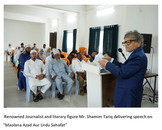Maulana Azad aur Urdu Sahafat
- Nov 17, 2025
- 2 min read
Updated: Nov 20, 2025
The Department of Urdu, in the Faculty of Language (FoL) at the Khaja Bandanawaz University, held an academic program called "Maulana Azad aur Urdu Sahafat" on 17 November 2025 in the PG Building FoL (3rd Floor). The program aimed to refresh the community's memory of Maulana Azad's immense contribution to Urdu journalism and how we can learn from that history into our contemporary media practices. The program was presided by Prof. M.A. Hameed Akber and featured two distinguished guests Mr. Shameem Tariq (journalist, poet and critic) , Dr. Jawed Akhter (assistant professor at the Dept. of MCJ, KBNU) and Dr. Kouser Parveen, Secretary "Mahfil e Nisa" Bangalore Br. Gulbarga.
The guests provided a vibrant historical context for Azad's journalism effort and his periodicals -- which included Lisan-us-Sidq, Al-Hilal, and Al-Balagh -- and shared how these periodicals displayed literary merit and offered a critique of social conditions and engagement in social and political consciousness. Mr. Shameem Tariq spoke about the ability of the Urdu press that Azad harnessed to disrupt misrepresentation, articulate morality, and a communal way of being, and Dr. Jawed Akhter related it to professional ethics for a contemporary journalist's responsibility to their public. Dr. Kouser Parveen spoke about the contributions of Moulana Azad towards reforms in Journalism and Urdu Literature.
The event featured an invocation, welcome address, student readings, and vote of thanks. More than 70 participants attended, including 50 students, 14 faculty members, and six external guests, and the interactive Q&A demonstrated that students were very engaged with questions about journalists' ethics, reach, and responsibility. The guests commended the organization of the event as well as the students' willingness to engage critically with historical precedents.
Outcomes included rebuilding student awareness of journalism as a decision-making tool for social improvement or reform as well as guidance to make sure they are maintaining standards in their reporting efforts and encouragement to pursue research in the history of Urdu media. The Department's efforts to connect historical awareness with current practice was very much appreciated by guests. Ultimately, the program reiterated the university's commitment to developing informed, responsible communicators in service of the public good - a mission that continues to be a touchstone for our educational philosophy.






























































Comments